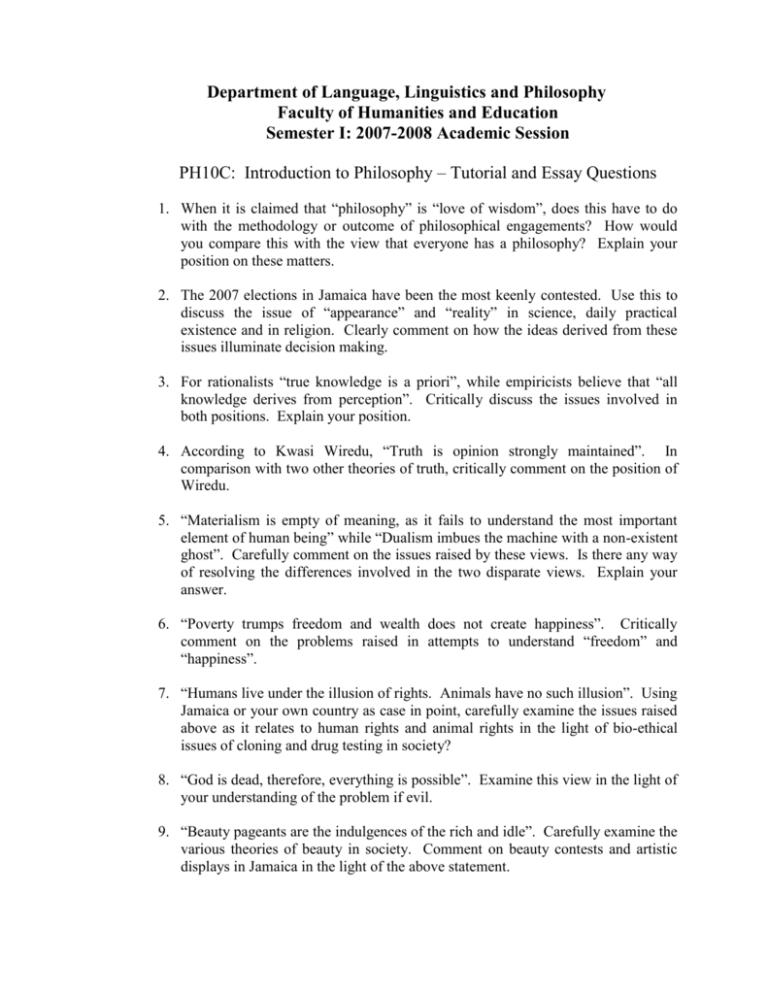Daily language philosophy
Differences of philosophy and logic experience
Daily language philosophy and logic empirical is analyzing two side-by-columns of philosophy, the main differences in their views are:
< P> 1 logical experience, it is considered that the daily language is not accurate, it is easy to cause the philosophical confusion, it is necessary to construct a precise artificial language to eliminate confusion; the daily language management believes that the daily language itself is perfect, philosophical chaos is generated, because of philosophers They have deviated from the correct usage of the daily language. By studying the usual language usage, they can "healing" the philosophy of this philosophy, so there is no need to construct artificial language.2 logical experience, it is meaningless, and the upper school proposition is meaningless. Philosophies should eliminate it through logic analysis of the language; the daily linguistic distribution is considered, although the proposition of the upper school is ridiculous, but it has insumed, Philosophies should learn the structure of the concept system through research.
3 logical experience student research language, mainly for the elimination of the language chaos; the daily language school requires further study of the details of the language itself, and studying the daily use of words related to the recognition.
Cambridge School and Oxford School
The daily linguistic distribution is divided into Cambridge School and Oxford School. The Cambridge School was formed in the middle of the 1930s, and it is a central base for Cambridge University. The main representative is J.T.D. Wiston. The Oxford School was formed in the 1940s, and the climax of the development is the 1950s. It is based on Oxford University, with G. Rail, J. Austin, PF Stelosen, F. Wesman and others as the main representative . In contrast, the influence of the Oxford School is much more affected by the Cambridge School. It is the main fair of the Chinese philosophy. Some philosophers even use them as synonymous. The Oxford School has accepted Vitgenstein on opposition to constructive language. The task of philosophy is mainly to study the daily usage of words and statements in natural language. Partially accept his daily life about philosophical problems only in terms of philosophers. Usage, the solution about philosophical problems is just the views of the daily use of language, and the Oxford School Bettegenstein has emphasized the study of the details of the daily language itself.
Basic views of the two schools
The Cambridge School and the Oxford School have some differences, but the basic view is consistent. It is mainly manifested as the following:
The first point
1 Visit language analysis. These two schools, especially the Oxford School, regarded language analysis as the primary, even the only task, emphasizing the richness of the concept of concepts in the natural language and the subtle difference between the concept, and believes that the concept can complete a variety of functions. Can fully meet the different needs of the user. The main representatives of these two sent, almost all the main energy is used to analyze the daily language, hoping to clarify the various functions of the language by clarifying the text or concepts, to reveal the rich content of the daily language . They often analyze only the difference between the two, three words; people generally believe that these words are synonymous, but they have shown that there is a big difference between them, emphasizing them cannot be exchanged. To determine the different roles that these words can, they carefully study the usage of these words in different contexts. In this respect, Austin's research is most prominent. In the article "Others' Heart", he carefully analyzed the various uses of the word "know"; in its "request forgive", "mistakes", "accident", "negligent", etc. Words and illustrate the different roles of these words in constant responsibility judgment.
Due to the language analysis philosopher emphasizes the study of the daily language itself, other genre philosophers accuse them not study philosophy, but study language. For these accusations, they refute that as long as this research is useful, they don't care about the philosophical research, or called language research. They said that they didn't have the ambition of Wittgenstein, and they did not think that their own analytical methods were real philosophical methods, which helped solve the traditional philosophical problem. However, they emphasized that the study of daily language is of great significance to solve philosophical problems, because there is an effective philosophical study, you can't first understand the language means we use. Through this study, many philosophical issues will be found to be misunderstood. So Austin claims that this study of the daily language is not the initial goal of philosophical research, even if it is not a philosophical study.
The daily language philosophers have emphasized the language analysis, but they are inherited, especially Austin and Stelosen, but tend to replace the term "analysis" with the word "interpretation". It is believed that the former will more describe the task of philosophy than the latter. They pointed out that philosophy tasks are to explain the logical syntax of certain words, collecting tips related to these words, describing the different functions of these words and their conditions.
Second point
2 affirmative and active aspects of school. The representatives of these two factions are informative and have a sure attitude. Wisston emphasizes that the on-the-way proposition is wrong, on the other hand, there is inspiration, because people can find many hidden truths in the contradiction between school. In these languages, philosophers seem to, and the error of the proposition is often used, mainly to use similar words to different examples, or use different words to use similar examples; shapes and predecessors have inspiration, Can remind people to pay attention to the same or differences that are concealed by the daily language. Therefore, they call for not to negate the shape, and to "treat", the confusion in the top school, from which to find valuable ingredients. The Stransen from the 1950s clearly put "describes the shape" as the main topic of its research. He emphasized the description of the form and going to discover the most common characteristics of the concept structure, and believed that this research will have significant contributions to the development of human knowledge. He pointed out that the description of the "corrected shape and school" described in the past, because its mission is only to describe our ideological structure on the world, not to construct a better structure; it is also different from the usual concept Analysis, because its research scope is much larger than the latter, with large universality.

third point
3 emphasis on the meaning of the word usage. These two philosophers have roughly the same point of view in terms of meaning theory, oppose logic empiricism's significance of propositions in the prodigal demonstration method. Witchon is not a visual authenticity of logical experience, thinking that this principle is neither a sense of propositions, nor an experience statement, but a form of an upper school theory, so it cannot be placed against it in accordance with it. Ray and Austin regard the meaning of the words as the functionality completed by this word, oppose the meaning of meaning as some kind of abstract entity. Rally believes that the meaning of the meaning is the word or phrase, not the statement. Stransen emphasizes the differences between the words and words used, and the differences of statements and statements are considered that the meaning is the function of words or statements. It is said that the function of the use of words, the true value is the function of the use of statements. He also pointed out that the meaning of the words or statements is not to talk about their use under specific occasions, but talk about the correctness of the word correctly under all situations, or use the statement to make a definite thing. Formula.
Decline of daily language philosophy
After the 1960s, the daily language philosophy gradually declined, on the one hand, because of its main representative Wesman and Austin, Lai Lier and Wis The year is retired; on the other hand, because of its later representative Stelsen, S. Hamp Snor (1914 ~ 2004) and other people's research direction changed. They don't satisfy the previous Ray, especially the study of Austin and others, and emphasize the systemicity of research, emphasizing the comprehensive investigation of problems, and trying to reveal the most common characteristics of the conceptual structure. Despite this, some traditional perspectives of this school, such as language analysis, meaning theory, language behavior, etc., some analysts, such as WS Sierras, RM Zi Sos, RM, JR Seli, etc. There is still an effect.
Shallow release
Daily Language Philosophy [Ordinary Language Philosophy], germination in the 1930s to forty years, is one of the primary geography of philosophy. This article is slightly introduced to this genre and comment on Taojie.
At the beginning of the 20th century, Russell, Freg, early Wittgenstein, 蒯........................................................................................................................................................... Certify the blurred language with a strict logic analysis language. They advocate constructing a precise and disamboratable ideal language.
However, language is the social history of people evolved. Textual law, word meaning, synonym, voice, etc., will evolve. These evolution depends on how people use it. [[George Edward Moore], Austin [Jl Austin], Strasen [PF strawson], Sel [John R. Searle], advanced Venistan and other people advocate, philosophical analysis tasks are not constructive Artificial language. Conversely, language has a variety of functions in human society, and the meaning of words is attributed to daily use.
First look at Mulian conceptual analysis. Muir emphasized that his research is not inspiring the outside world, and it is to analyze other philosophers a spindle. Taking ethics as an example, philosophers did not analyze the concept of "morality", "virtues", "just", "should", "good", "evil" peer, so there is an endless dispute. Mustrial analysis, three points: analysis is the meaning of understanding concept, this one; divide the concept into several constituent concepts, this second; contact known concept and other concepts, this three. For example, try "Happy". What is "Happy"? What do you think of? How do you explain this concept to others? What is similar to "Happiness"? If the philosophical analysis violates the daily language, it is wrong.
Osdink believes that many arguments in the philosophy are no fruit, because the terms used in the academic community are not true. Those arguments, not outside the use of terminology. Austin advocates that there is some sentences that have no true and false, talking is to do things. Previously, it is generally considered that the statement is only described. Osdin believes that there are still some non-description functions. People talk, in addition to expressing, there is nothing. There are five: judgment, such as "pronunciation", "confirmation"; implementation, such as "appointment", "revoke"; constraint, such as "promise", "pray"; behavior, such as "Thank", "apologize" Interpretation, such as "Description", "answer".
The Seli is ansh. Sel did not completely accept the theory of Austin, but the difference between the two is even less tough, and it is inconvenient to talk about it. And look at another more interesting theory: indirect speech behavior. I tried
* Can you put your door?
* Can I ask you to close?
* You'd better get the door when coming in.
* When you come in, it seems to have forgotten a thing.
* 嗳! It's so cold, the original door has nothing to do.
to see a conversation:
Male: Do you eat outside tonight?
Female: I want to work at home.
boults to ask the request, the girl answers the statement, the meaning of the words [Seller "is" tentative "]" Tonight can not be eaten together. "
Take the game word, the advanced Vitgenstein believes that the grammar rules are arbitrary, it does not matter to be right, and if it is applied or not. There is rules in language, but the rules are not constant. Different rules are sometimes confusing. Augustine [St. Augustine] is confused when "Time is", because because there is no use of "measure". We can use the European Miltrus geometry and use non-European geometries. That depends on the purpose of use. But we generally can't use non-European geometry to use non-European geometry.
TaojieOne article criticizes "unspeakable". He believes that "the section is to pay attention to the operation, the more small festival, the more you see the big problem." The "small section" mentioned in "Unscrupulous" is "small", it means "miniature trivial rather than important s things". Taojie said "Detail", refers to "fine, delicate, and unimpleted."
Lin Yutang "Contemporary Han Ying Dictionary" is solution: "Section [xiao3jie2], N., Minor Points of Conduct.", "Section Trifles, Trivialities: Unconstrained Unconventional, Unconstrained by Formalities".
Tao Jie's "Detail" is not a "small section" that is usually used. His argument is a usual usage of twisted words, which is rated. No debate, there is no difference.
Latest: Maxi
Next: 3D model








